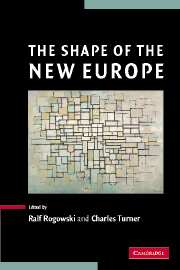Book contents
- Frontmatter
- Contents
- List of Contributors
- Acknowledgements
- 1 Europe: Law, Politics, History, Culture
- Part I Constitutionality and Political Participation
- 2 Why Europe needs a Constitution
- 3 Why Constitutionalise the European Union?
- Part II European Polity and European Civil Society
- Part III European History and European Culture
- Part IV Europe and The World
- Index
- References
3 - Why Constitutionalise the European Union?
Published online by Cambridge University Press: 22 September 2009
- Frontmatter
- Contents
- List of Contributors
- Acknowledgements
- 1 Europe: Law, Politics, History, Culture
- Part I Constitutionality and Political Participation
- 2 Why Europe needs a Constitution
- 3 Why Constitutionalise the European Union?
- Part II European Polity and European Civil Society
- Part III European History and European Culture
- Part IV Europe and The World
- Index
- References
Summary
The question of whether and, if so, when to constitutionalise the European Union (EU) entered serious public debate with the speech of Joschka Fischer at Humboldt University in 2000. In virtually all member states, prominent politicians subsequently felt compelled to express their opinion on this issue. Not surprisingly, they came up with very different versions of what such a European constitution should contain. Some wanted it in order to limit any further expansion of the competences of the EU; others wanted it in order to provide the EU with sufficient authority to cope with a wider agenda and a large number of members. But on two things there seemed to be general agreement: (1) the EU could not continue solely on the basis of treaties that have to be revised periodically and ratified by each member state – if only because this had already become much more difficult to do with fifteen members and even more so with twenty-five; and (2) this change in the fundamental institutional basis of European integration should happen sooner rather than later.
I remain convinced that both of these assumptions were (and still are) wrong. The EU does not need a constitution, not only because it has not done badly with a quasi-constitution based on successive treaties, but also because the flexibility provided by the lack of an agreed distribution of competences between it and its member states and, especially, the absence of a common definition of its political end-state (the so-called finalité politique) are precisely what the EU will need in the coming years when it will have to face the dual challenges of governing the effects of monetary unification and coping with the dislocations generated by enlargement.
- Type
- Chapter
- Information
- The Shape of the New Europe , pp. 46 - 58Publisher: Cambridge University PressPrint publication year: 2006
References
- 1
- Cited by



